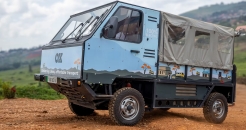 Easy-to-assemble flatpack electric trucks for Africa
Easy-to-assemble flatpack electric trucks for Africa
From an article by Reasons to be Cheerful
Esperance Dushakimana looks at her field of potato in Musanze district in North Rwanda. “It is hard,” she says. “We till the land, sow the seeds, reap the harvest and then watch helplessly while at least a fifth of it perishes before it reaches the market.”
Barely 30 miles away in Rubavu, mushroom farmer Vincent Ngamije is forced to sell his harvest on the cheap across the border in Congo, instead of in Kigali, Rwanda’s capital, where he can get a better price. “The market in DRC is barely 40 minutes away, and in contrast, my mushrooms can reach Kigali only after spending five hours in a warm truck. Barely 40 percent will survive.”
The issue is global. About 25 to 30 percent of food produced worldwide is wasted. The Food and Agricultural Organization (FAO) estimates that every year, about USD $400 billion worth of food is lost before it ever reaches the market.
Better logistics is an obvious solution, but it is not as simple as that. Long-haul diesel trucks have a massive carbon footprint; the US Environmental Protection Agency estimates that in 2022 more than three percent of all carbon dioxide (CO2) emissions came from them.
Simon Davis is the founder and CEO of the UK-based Ox Delivers, which has developed, according to the company website, “the world’s first purpose-designed electric truck” for Africa. It was launched in Rwanda in 2021 and is almost 10 times cheaper to run compared to existing alternatives. And it offers farmers the cost-effective choice of renting the space they need for as little as a dollar depending on weight and distance, instead of the entire truck (for about $500), to transport their agricultural produce from farm to market.
Refrigeration capacity can be added to all these trucks and the company has also developed a mountable cool box for non-refrigerated trucks.
The story of Ox began in 2013, when Sir Torquil Norman, the British pilot and toy entrepreneur, tasked the Formula 1 race car designer Gordon Murray to design a vehicle to transport goods in low-income countries. Murray’s design - a somewhat squat truck made of interchangeable and easy-to-maintain parts that could be constructed in the UK and shipped in easy-to-assemble flatpacks - was practical, even if unlikely to win any beauty contests. In the next few years, Ox transformed into a logistics company, offering farmers “ride shares” for their produce for less than a dollar.
The reduced spoilage of harvests and the convenient logistics have encouraged some of their customers to grow more and sell more. In Kyazo, in Rwanda’s Western Province, Jean Paul grows chili peppers. Until a couple of years ago, reaching Kigali, 105 miles away, was a logistical nightmare that took 2 days and involved bicycle, bus and motorbike. In 2021, when he began renting space in an Ox truck, the improved access to the market encouraged him to grow more. Today, he has gone from selling 400 to 4,000 kilograms of peppers a week to an exporter in Kigali.
With a fleet of trucks and drivers, Ox Delivers has not yet managed to reach the length and breadth of Rwanda due to the inadequacy of public charging infrastructure beyond Kigali. The EVs have a range of 170 kilometres and at present they need to return to the company’s docking stations to recharge. Ox Delivers are now working to develop and expand sustainable energy infrastructure in Rwanda.
Read the full article here.
Watch this 6 minute video of customer stories:
Retweet about this article:
From an article by Reasons to be Cheerful, 23/04/2025